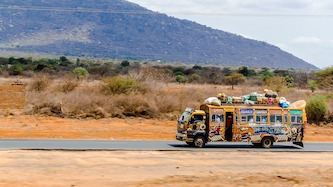The cost of living in Sub-Saharan Africa is increasing due to weak currencies in the region. This has resulted in higher prices for food, transportation, and commodities. In Nigeria, for example, the price of frozen chicken has increased by over 26% in the past three months. Customers are buying less, and businesses are struggling to sell their goods. The weakening of currencies, such as the Nigerian naira and the Angolan kwanza, is caused by factors such as a shortage of foreign exchange and a reliance on imports.
The shortage of foreign exchange leads to higher exchange rates, making it more expensive for businesses to import raw materials. These increased costs are then passed on to consumers through higher prices. Additionally, businesses may have difficulty retrieving their money in foreign currency from the central bank, causing them to suspend operations. This has a negative impact on the economy and can deter foreign investors. Oil-producing countries like Nigeria and Angola, despite selling oil in US dollars, have accumulated large debts and heavily subsidize local fuel and energy prices, which depletes their foreign currency reserves.
Governments in the region are taking measures to address the issue. For example, Nigeria’s central bank plans to inject $10 billion worth of foreign exchange into the market to settle foreign exchange debts. They have also lifted bans on certain imported items to reduce demand for foreign currency. Ghana has implemented a “gold for oil” policy, using gold instead of cash to buy oil and save foreign reserves. Egypt has sought barter agreements to reduce reliance on the US dollar. These efforts aim to stabilize local currencies and reduce dependence on foreign currencies.
To support local currencies, African countries need to trade more with each other and buy locally made goods. The implementation of the Continental Free Trade Agreement (AfCFTA) is seen as a way to boost intra-African trade and investment. However, challenges such as weak infrastructure and connectivity hinder trade within the continent. Strengthening productivity and competitiveness, as well as improving infrastructure, are crucial for Africa to match global standards in goods and services.
The impact of weak currencies is evident in businesses like Arinola Omolayo’s frozen food store in Lagos. With soaring prices, customers are buying less, and businesses are struggling to make sales. To overcome these challenges, it is important for African countries to prioritize trade within the continent and support local currencies through increased productivity and competitiveness.
Original news source: Weak currencies force up cost of living in Sub-Saharan Africa (BBC)
Listen
Slow
Normal
Fast
Group or Classroom Activities
Warm-up Activities:
– News Summary
Instructions: Students will be paired up and given a few minutes to scan the article and note down key points. Each pair will then take turns summarizing the article to the other, focusing on conciseness and accuracy. They should aim to present the summary in under one minute. Peers will give feedback on clarity and completeness.
– Opinion Poll
Instructions: Create a series of statements based on the article’s content (e.g., “The weakening of Sub-Saharan African currencies is primarily due to their reliance on imports.”). Students will stand on a line in the classroom where one end represents ‘strongly agree’ and the other ‘strongly disagree.’ Students will place themselves along the line according to their opinion and then discuss their reasoning in small groups.
– Vocabulary Pictionary
Instructions: Write down key terms from the article (such as “commodities,” “foreign exchange,” “subsidize,” “infrastructure”) on slips of paper. Students will take turns drawing the term they pick while their team guesses the word. Set a time limit for each round to keep the game moving quickly.
– Future Predictions
Instructions: After discussing the article, ask students to write down their predictions about the economic situation in Sub-Saharan Africa for the next five years. They should use vocabulary and concepts from the article in their predictions. Once they have written their predictions, they should share with a partner and discuss the likelihood of these future scenarios.
– Article Timeline
Instructions: Students will work in groups to create a timeline using key events and information from the article, such as the increase in the price of frozen chicken, measures taken by governments, and the introduction of the Continental Free Trade Agreement (AfCFTA). This will help them practice sequencing information and using past tenses accurately. Once completed, they can present their timeline to the class.
Comprehension Questions:
1. What is the primary reason for the increasing cost of living in Sub-Saharan Africa?
2. How much has the price of frozen chicken increased in Nigeria over the past three months?
3. What are some of the factors causing the weakening of currencies in Sub-Saharan Africa?
4. How does the shortage of foreign exchange affect businesses and the economy in the region?
5. What measure is Nigeria’s central bank taking to address the foreign exchange issue?
6. Describe Ghana’s “gold for oil” policy and its intended purpose.
7. What challenges are faced by the implementation of the Continental Free Trade Agreement (AfCFTA)?
8. What impact has the weak currency had on Arinola Omolayo’s frozen food store in Lagos?
Go to answers ⇩
Listen and Fill in the Gaps:
The cost of living in Sub-Saharan Africa is increasing due to weak currencies in the region. This has resulted in (1)______ prices for food, transportation, and commodities. In Nigeria, for example, the price of frozen chicken has increased by over 26% in the past three months. (2)______ are (3)______ less, and businesses are struggling to sell their goods. The weakening of currencies, such as the Nigerian naira and the Angolan kwanza, is caused by factors such as a (4)______ of foreign exchange and a reliance on imports.
The shortage of foreign exchange leads to higher exchange rates, making it more expensive for businesses to import raw materials. These increased costs are then passed on to (5)______ through higher prices. Additionally, businesses may have difficulty retrieving their money in foreign (6)______ from the central bank, (7)______ them to suspend operations. This has a negative (8)______ on the economy and can deter foreign investors. Oil-producing countries like Nigeria and Angola, despite selling oil in US dollars, have accumulated large debts and heavily subsidize local fuel and energy prices, which depletes their foreign currency reserves.
Governments in the region are taking measures to address the issue. For example, Nigeria’s central bank plans to inject $10 billion worth of foreign exchange into the market to settle foreign exchange debts. They have also lifted bans on certain imported items to reduce demand for foreign currency. (9)______ has implemented a “gold for oil” policy, using gold instead of cash to buy oil and save foreign reserves. (10)______ has sought barter agreements to reduce reliance on the US dollar. These (11)______ aim to stabilize local currencies and reduce dependence on foreign currencies.
To support local currencies, African (12)______ need to trade more with each other and buy locally made goods. The implementation of the Continental Free Trade Agreement (AfCFTA) is seen as a way to boost intra-African trade and investment. However, challenges such as weak infrastructure and connectivity (13)______ trade within the continent. Strengthening productivity and (14)______, as well as improving infrastructure, are crucial for Africa to match global standards in goods and services.
The impact of weak currencies is evident in businesses like Arinola Omolayo’s frozen food store in (15)______. With soaring prices, (16)______ are buying less, and businesses are struggling to make sales. To overcome these challenges, it is important for African countries to prioritize trade within the continent and support local currencies through increased productivity and competitiveness.
Go to answers ⇩
Discussion Questions:
Students can ask a partner these questions, or discuss them as a group.
1. What do you think are the main challenges faced by countries with weak currencies?
2. How would you feel if the currency in your country significantly weakened?
3. Do you think relying on imports is a sustainable economic strategy for a country? Why or why not?
4. Have you or someone you know ever experienced a significant rise in the cost of living? How did it affect your daily life?
5. What is your opinion on the effectiveness of measures like Nigeria’s injection of foreign exchange into the market?
6. Do you like the idea of a “gold for oil” policy as implemented by Ghana? Why or why not?
7. How do you think barter agreements can benefit an economy?
8. Do you think the implementation of the Continental Free Trade Agreement (AfCFTA) will help African countries? Why or why not?
9. What is your perspective on the importance of trade between neighboring countries?
10. How would you feel if businesses in your area had to suspend operations due to economic issues?
11. Do you think that African countries should focus more on trading with each other rather than with external partners?
12. How do you think weak infrastructure and connectivity affect a country’s ability to trade?
13. What is your opinion on government subsidies for fuel and energy? Are they helpful or harmful in the long run?
14. How do you think countries can improve their productivity and competitiveness in the global market?
15. Do you believe that supporting local businesses and products is crucial for an economy’s health? Why or why not?
Individual Activities
Vocabulary Meanings:
Match each word to its meaning.
Words:
1. Sub-Saharan
2. weak
3. prices
4. customers
5. foreign exchange
6. local
7. trade
8. productivity
Meanings:
(a) Relating to or originating from a particular place or country
(b) The amount of money that something costs
(c) Not strong or powerful
(d) The region in Africa south of the Sahara Desert
(e) The buying and selling of goods and services
(f) The currency of another country
(g) The rate at which goods or services are produced
(h) People who buy goods or services
Go to answers ⇩
Multiple Choice Questions:
1. What is causing the cost of living in Sub-Saharan Africa to increase?
(a) Strong currencies
(b) Weak currencies
(c) High demand for goods
(d) Low supply of goods
2. How much has the price of frozen chicken increased in Nigeria in the past three months?
(a) Over 50%
(b) Over 10%
(c) Over 5%
(d) Over 26%
3. What is one factor that is causing the weakening of currencies in Sub-Saharan Africa?
(a) Increase in exports
(b) Shortage of foreign exchange
(c) Decrease in imports
(d) High demand for local goods
4. How do higher exchange rates affect businesses in Sub-Saharan Africa?
(a) It makes it cheaper for them to import raw materials
(b) It has no impact on their ability to import raw materials
(c) It makes it more expensive for them to import raw materials
(d) It allows them to sell their goods at higher prices
5. What impact can the inability to retrieve money in foreign currency from the central bank have on businesses?
(a) They can easily find alternative sources of foreign currency
(b) They can rely on local currency for their operations
(c) They can negotiate better exchange rates with the central bank
(d) They may have to suspend operations
6. What measures are governments in Sub-Saharan Africa taking to address the issue of weak currencies?
(a) Increasing taxes on imported goods
(b) Encouraging businesses to rely more on foreign currencies
(c) Injecting foreign exchange into the market and lifting bans on certain imported items
(d) Implementing strict currency controls
7. How can African countries support their local currencies?
(a) By trading more with each other and buying locally made goods
(b) By relying more on foreign currencies for trade
(c) By accumulating large debts to boost foreign currency reserves
(d) By reducing the production of local goods
8. What challenges hinder trade within the African continent?
(a) Weak infrastructure and connectivity
(b) Strong infrastructure and connectivity
(c) High demand for goods and services
(d) Low supply of goods and services
Go to answers ⇩
True or False Questions:
1. The cost of living in Sub-Saharan Africa is increasing due to weak currencies in the region.
2. African countries are not taking measures to stabilize local currencies, such as injecting foreign exchange into the market or implementing barter agreements to reduce reliance on the US dollar.
3. Businesses in Sub-Saharan Africa are struggling to sell their goods due to customers buying less.
4. Businesses in Sub-Saharan Africa may have difficulty retrieving their money in foreign currency from the central bank, causing them to suspend operations.
5. The abundance of foreign exchange does not lead to higher exchange rates, making it less expensive for businesses to import raw materials.
6. The price of frozen chicken in Nigeria has increased by over 26% in the past three months.
7. Oil-producing countries in Sub-Saharan Africa have not accumulated large debts and do not heavily subsidize local fuel and energy prices, thus preserving their foreign currency reserves.
8. The strengthening of currencies in Sub-Saharan Africa is not caused by factors such as a shortage of foreign exchange or a reliance on imports.
Go to answers ⇩
Write a Summary:
Write a summary of this news article in two sentences.
Check your writing now with the best free AI for English writing!
Writing Questions:
Answer the following questions. Write as much as you can for each answer.
Check your answers with our free English writing assistant!
1. What factors have contributed to the weakening of currencies such as the Nigerian naira and the Angolan kwanza?
2. How are the rising costs of living affecting businesses and consumers in Sub-Saharan Africa?
3. What strategies are governments in Sub-Saharan Africa implementing to address the shortage of foreign exchange?
4. Why is the Continental Free Trade Agreement (AfCFTA) important for the economies of African countries?
5. How is Arinola Omolayo’s frozen food store in Lagos indicative of the broader economic challenges faced by businesses in the region?
Answers
Comprehension Question Answers:
1. What is the primary reason for the increasing cost of living in Sub-Saharan Africa?
The primary reason for the increasing cost of living in Sub-Saharan Africa is the weakening of currencies in the region, which leads to higher prices for food, transportation, and commodities.
2. How much has the price of frozen chicken increased in Nigeria over the past three months?
The price of frozen chicken in Nigeria has increased by over 26% in the past three months.
3. What are some of the factors causing the weakening of currencies in Sub-Saharan Africa?
Factors causing the weakening of currencies in Sub-Saharan Africa include a shortage of foreign exchange, a reliance on imports, accumulated large debts, and heavy subsidies on local fuel and energy prices.
4. How does the shortage of foreign exchange affect businesses and the economy in the region?
The shortage of foreign exchange leads to higher exchange rates, making it more expensive for businesses to import raw materials. This results in increased costs that are passed on to consumers. Businesses may also face difficulties retrieving their money in foreign currency from the central bank, causing them to suspend operations, which negatively impacts the economy and can deter foreign investors.
5. What measure is Nigeria’s central bank taking to address the foreign exchange issue?
Nigeria’s central bank plans to inject $10 billion worth of foreign exchange into the market to settle foreign exchange debts and has lifted bans on certain imported items to reduce demand for foreign currency.
6. Describe Ghana’s “gold for oil” policy and its intended purpose.
Ghana’s “gold for oil” policy involves using gold instead of cash to buy oil in order to save foreign currency reserves.
7. What challenges are faced by the implementation of the Continental Free Trade Agreement (AfCFTA)?
Challenges faced by the implementation of the Continental Free Trade Agreement (AfCFTA) include weak infrastructure and connectivity that hinder trade within the continent.
8. What impact has the weak currency had on Arinola Omolayo’s frozen food store in Lagos?
The weak currency has led to soaring prices, resulting in customers buying less and businesses like Arinola Omolayo’s frozen food store in Lagos struggling to make sales.
Go back to questions ⇧
Listen and Fill in the Gaps Answers:
(1) higher
(2) Customers
(3) buying
(4) shortage
(5) consumers
(6) currency
(7) causing
(8) impact
(9) Ghana
(10) Egypt
(11) efforts
(12) countries
(13) hinder
(14) competitiveness
(15) Lagos
(16) customers
Go back to questions ⇧
Vocabulary Meanings Answers:
1. Sub-Saharan
Answer: (d) The region in Africa south of the Sahara Desert
2. weak
Answer: (c) Not strong or powerful
3. prices
Answer: (b) The amount of money that something costs
4. customers
Answer: (h) People who buy goods or services
5. foreign exchange
Answer: (f) The currency of another country
6. local
Answer: (a) Relating to or originating from a particular place or country
7. trade
Answer: (e) The buying and selling of goods and services
8. productivity
Answer: (g) The rate at which goods or services are produced
Go back to questions ⇧
Multiple Choice Answers:
1. What is causing the cost of living in Sub-Saharan Africa to increase?
Answer: (b) Weak currencies
2. How much has the price of frozen chicken increased in Nigeria in the past three months?
Answer: (d) Over 26%
3. What is one factor that is causing the weakening of currencies in Sub-Saharan Africa?
Answer: (b) Shortage of foreign exchange
4. How do higher exchange rates affect businesses in Sub-Saharan Africa?
Answer: (c) It makes it more expensive for them to import raw materials
5. What impact can the inability to retrieve money in foreign currency from the central bank have on businesses?
Answer: (d) They may have to suspend operations
6. What measures are governments in Sub-Saharan Africa taking to address the issue of weak currencies?
Answer: (c) Injecting foreign exchange into the market and lifting bans on certain imported items
7. How can African countries support their local currencies?
Answer: (a) By trading more with each other and buying locally made goods
8. What challenges hinder trade within the African continent?
Answer: (a) Weak infrastructure and connectivity
Go back to questions ⇧
True or False Answers:
1. The cost of living in Sub-Saharan Africa is increasing due to weak currencies in the region. (Answer: True)
2. African countries are not taking measures to stabilize local currencies, such as injecting foreign exchange into the market or implementing barter agreements to reduce reliance on the US dollar. (Answer: False)
3. Businesses in Sub-Saharan Africa are struggling to sell their goods due to customers buying less. (Answer: True)
4. Businesses in Sub-Saharan Africa may have difficulty retrieving their money in foreign currency from the central bank, causing them to suspend operations. (Answer: True)
5. The abundance of foreign exchange does not lead to higher exchange rates, making it less expensive for businesses to import raw materials. (Answer: False)
6. The price of frozen chicken in Nigeria has increased by over 26% in the past three months. (Answer: True)
7. Oil-producing countries in Sub-Saharan Africa have not accumulated large debts and do not heavily subsidize local fuel and energy prices, thus preserving their foreign currency reserves. (Answer: False)
8. The strengthening of currencies in Sub-Saharan Africa is not caused by factors such as a shortage of foreign exchange or a reliance on imports. (Answer: False)
Go back to questions ⇧















